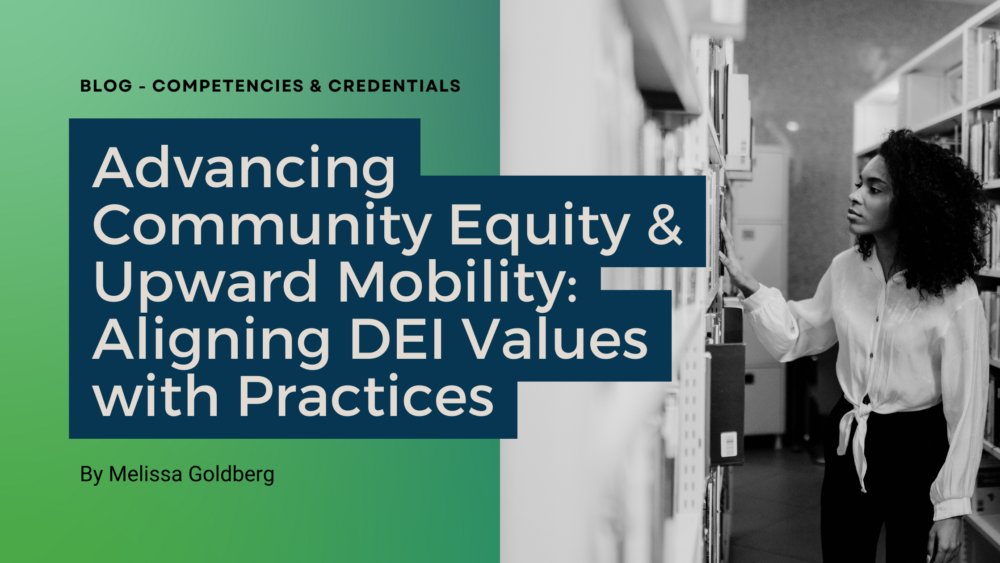Corporation for a Skilled Workforce (CSW) has had the good fortune to work recently with a set of passionate community college leaders and their industry partners who are striving to create a more equitable learn and work ecosystem. They are members of ACE-UP, a Lumina Foundation-supported community of practice designed to strengthen the capacity of community colleges to address equity gaps and meet the skill development and recruitment diversification needs of employers in in-demand industries and those of marginalized and underrepresented workers. Yet the work has taken on new meaning since we launched ACE-UP in October of 2022.
Diversity, equity and inclusion (DEI), a framework for creating opportunities for all comers to succeed, seems aligned with the American dream. Yet in our hyper-political world these terms and such a framework are dividing the country. So how do we create a fairer system in our current climate?
Forty-six attendees representing 17 ACE-UP member institutions recently came together to discuss what we all mean when we use these terms. During a dynamic session called “It’s An Inside Job: Conversations about DEI at the Intersection of Our Heads and Hearts”, speaker, Attorney, and Professor Natasha L. Robinson led the charge. She challenged the group to assess their reasons for engaging in equity work, assemble the necessary ingredients for creating a heartset and mindset of equity and inclusion, and align their values and habits to articulate their commitment to equity and inclusion in their work, pedagogy, and practices. Professor Robinson also raised the crucial issue of affirmative action and encouraged the group to consider how they can continue their equity work in a changing environment.
The session resonated with many of the attendees who thought about and discussed their institutions’ approaches to DEI, how they champion learner and worker advancement, and the challenges they face.
Among the questions posed were:
- How can college leaders move from a statement on the website to real action?
- How can college leaders engage learners, employers, and members of the campus community in meaningful conversations about the importance of DEI and meet the needs of all stakeholders?
The community of practice members shared efforts they are making with student recruitment and admissions policies, learner supports, and using disaggregated data to inform efforts to address issues of occupational segregation. The common theme to these innovations is the focus on creating learner-centered programs and institutions. The following highlight a sampling of these efforts
Recruitment Efforts
One college has looked at the demographics of the community it serves—age, ethnicity, levels of education, gender, and others, and has determined recruitment strategies specifically targeted to the different categories of prospective learners. In this way the institution has engaged a fresh wave of learners
Addressing Barriers
Several institutions have taken a deep dive into the barriers preventing prospective learners from enrolling in or completing programs. These barriers include the need for greater transparency about programs, connections to financial aid, and ensuring learners’ basic needs are addressed. The solutions include creating a student success team working with students and learners to identify barriers and address them. Some have built food pantries, others a special emergency fund to cover rent, transportation or childcare services. Still others developed a special pot of money to cover expenses such as uniforms, tools and other related necessities. In one case these efforts have contributed to higher retention and completion rates among a student body that is 76% students of color, 88% male, and largely first-generation students
Career Planning Services
One ACE-UP college is connecting learners to career planning before their educational program even begins. This effort is increasing transparency about the program and job prospects right from the start and leading to greater retention and learner success. Work-based learning experiences are also becoming more and more prevalent providing learners with hands-on experiences, and in some cases an opportunity to earn while they learn, providing exposure to the work and allowing those learners to demonstrate what they know and can do
Data-Informed Solutions
ACE-UP members are using data disaggregation in all aspects of college operations—providing course and program-level feedback to faculty to inform continuous improvement; implementing data-driven policy and practice changes and using data to inform decision-making processes for improved outcomes among all learners. One concrete example related to who was applying to a college’s nursing program. These programs are highly competitive with admissions preferences often going to those with some experience in the field. The college completed a community analysis to see who they were recruiting from their own backyard and the nursing program came up wanting. So, they created a more holistic approach to entrance criteria and then saw greater diversity in the nursing students.
These innovations are great examples of changes leading to greater DEI outcomes. They should be featured and scaled. There is also more work to be done and more questions to be answered. As we move forward with the ACE-UP community of practice we will continue to surface challenges and find solutions such as what information do institutions still need to create a fairer system in our current climate? What role do employers/industry play in this work? What messaging is working with whom? How can metric setting and data collection support success in DEI efforts moving forward? We will be working to find answers to these questions in future ACE-UP conversations.
Though the innovations described may have initially emerged due to DEI goals, they are actually common sense, customer- (think learner-) centric innovations that are improving service delivery and outcomes for all learners.



Comments are closed.